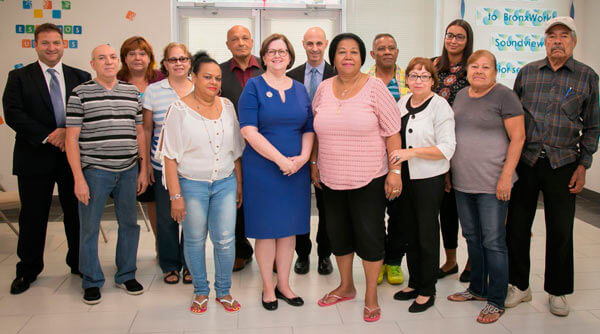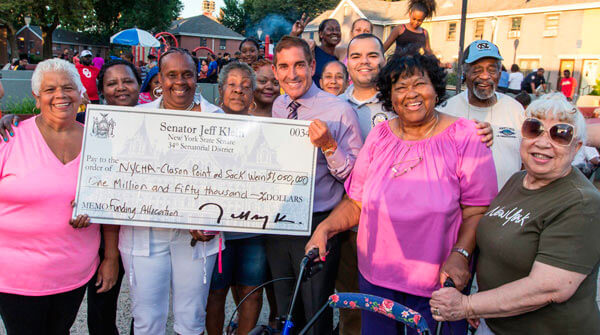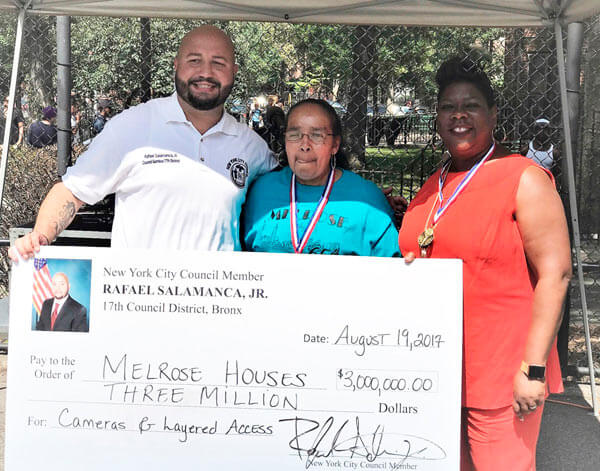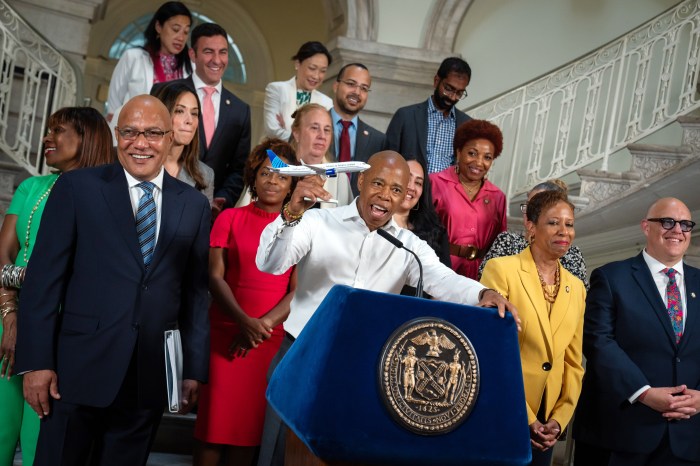For nearly two years a Bronx resident battled NYCHA in court alleging the city violated his housing rights. Finally, NYCHA settled with him last week.
On July 16, Legal Services NYC (LSNYC) and Paul, Weiss, Rifkind, Wharton & Garrison LLP (Paul, Weiss) announced the court-approved settlement of an anti-discrimination lawsuit against NYCHA that will reform the public housing agency’s reasonable accommodation and transfer systems to mitigate systemic delays and ensure that thousands of NYCHA tenants with mobility impairments will receive the accommodations that they need to live with dignity and respect.
This comes after Willie Espino, Jr., a 63 year-old wheelchair-bound veteran and resident of NYCHA’s Patterson Houses at 414 Morris Ave., sued the public housing agency in federal court in 2018 for allegedly violating city, state and federal anti-discrimination laws in its public housing projects by failing for nearly a decade to install a ramp at his apartment building or transfer him to a building with a wheelchair-accessible entryway. The settlement also includes a cash amount to be paid to Espino but the amount is confidential.
“I have always wanted to fight not just for myself but for all of my neighbors with disabilities who may have issues with NYCHA like I have had,” Espino said. “In my building alone, there were several other disabled people who were also experiencing hardship not having a ramp to enter and exit the building. My hope is that, with this settlement, other disabled NYCHA tenants will not have to experience harm like I suffered. Discrimination against disabled people is never right, and nobody should be treated poorly like I was treated.”
In 2018 he filed a federal complaint against NYCHA.
“NYCHA has violated, and continues to violate, Espino’s right to equal use and enjoyment of his home, as required by the Fair Housing Amendments Act, the Americans with Disabilities Act, the Rehabilitation Act, the New York State and New York City Human Rights Law and New York’s Real Property Law,” the complaint states.
In his complaint, Espino claimed that in 2011, he requested a reasonable accommodation for his mobility impairment in accordance with NYCHA procedures and that through 2018, Espino made numerous additional requests, including for the installation of a ramp at the entrance of his apartment building or a transfer to a wheelchair-accessible apartment building. But, each time, the public housing agency failed to fulfill his request. Worse, NYCHA delayed installing a ramp at the entrance of Espino’s building even after a Bronx Housing Court judge ordered NYCHA to install the ramp.
Without wheelchair access to his apartment building, Espino became a prisoner in his own home, unable to make his medical appointments and surgeries or even enjoy a breath of outside air without waiting in his lobby, sometimes for hours, for a neighbor to help him lay down a flimsy, makeshift ramp — fashioned from a piece of plywood — that he resorted to using to enter and exit his home with his 350-pound wheelchair.
As part of the settlement, NYCHA has agreed to amend its policies and procedures, including providing more information to mobility-impaired tenants about their rights to transfer to buildings and apartments that accommodate their mobility impairments, regularly updating tenants who have been approved for transfers but whose transfers have not been effectuated and reforming the dead-end waitlist system that puts tenants with different accommodation needs on the same waitlist for fully-accessible apartments.
“New York City’s affordable housing shortage means scores of disabled low-income New Yorkers must choose between being a prisoner in a NYCHA building or living in a homeless shelter,” said Sara Smith, staff attorney with LSNYC. “Our client, Mr. Espino, fought hard not only for his right to a reasonable accommodation, but for a settlement that improves the disability accommodation transfer system to ensure that every NYCHA tenant living with a disability has the right to enter and exit their home without being made to feel like a second-class citizen. No one deserves to be trapped by inaccessibility, and we’re hopeful that this settlement will ensure that NYCHA complies with the law and treats tenants living with disabilities with dignity.”
Approximately 20 percent of NYCHA’s 400,000 tenants are age 62 or older, many of whom have mobility limitations. Accessibility failures have long plagued the public housing agency. More than 20 years after NYCHA struck a deal with the U.S. Department of Housing and Urban Development by agreeing to make 5 percent of its apartments “fully accessible” for wheelchair users, records show that NYCHA is significantly behind, upgrading only one third of the goal.
























